Publications
With expertise in law, religion, education, and technology, Dr. Walker has published five books and various policy reports and research articles.
Current Research & Writing Projects
1. Nathan C. Walker, “Legally Defining Artificial Intelligence,” in B Cavello, Eleanor Tursman, and Nicholas Garcia, eds., Defining Technology of our Time: Artificial Intelligence. Washington, DC: Aspen Institute.
2. Nathan C. Walker, “AI Ethics & U.S. Presidents,” AI Ethics Lab, Rutgers University.
3. Solo Book: In Moral Imagination: Ethics & Empathy in the Age of AI, I harness the public’s questions about artificial intelligence through a series of morality plays. These plays introduce the practice of moral imagination, the ability to picture yourself in an ethical dilemma to understand competing points of view. Each chapter of the book presents real-life case studies on AI ethics, inviting readers to immerse themselves in complex scenarios that reveal the interplay between technology and human agency.
4. Edited Book: Nathan C. Walker, Dirk Brand, Caitlin Corrigan, Georgina Curto Rex, Alexander Kriebitz, John Maldonado, Kanshukan Rajaratnam, and Tanya de Villiers-Botha, eds. AI & Human Rights Index. New York: All Tech is Human; Camden, NJ: AI Ethics Lab at Rutgers University, 2025. This project supports the development of the “Munich Convention on AI and Human Rights.” Institute of Ethics in Artificial Intelligence, Technical University of Munich and Global Ethics, Geneva, Switzerland.
5. Edited Book: Founding Editor for Declarations of Interdependence: 250 Voices to Reimagine America’s Founding Promises. This documentary history reenvisions the Declaration of Independence (1776–2026) in light of its 250th anniversary next year. Its purpose is to shine a light on primary sources, such as landmark legal, political, and cultural ideas from historically significant voices, ranging from well-known figures to marginalized influencers.
6. Journal: Contributor to Alexander Kriebitz and Caitlin C. Corrigan, eds. “Toward a UN Human Rights Convention in the Age of AI: The Munich Convention as a Concrete Proposal for a Global AI and Human Rights Framework” (2025), currently in peer review with Minds & Machine (Springer).
7. Journal: Current consulting editor and former associate editor of the peer-reviewed journal Religion & Education (Taylor & Francis).
Reports
8. Contributor to Alexander Kriebitz and Caitlin C. Corrigan, eds. Promoting and Advancing Human Rights in Global AI Ecosystems: The Need for a Comprehensive Framework under International Law. Munich, Germany, February 20, 2025. With support from the Ludwig Maximilian University of Munich, the AI Ethics Lab at Rutgers University, the Responsible AI Network–Africa (RAIN-Africa), and the Globethics Foundation. Presented at a side event of the United Nations Human Rights Council in Geneva, Switzerland on March 20–21, 2025.
9. Lyal S. Sunga and Nathan C. Walker, “Freedom of Religion or Belief through Law: Current Dilemmas and Lessons Learned,” Rome, Italy: Int’l Development Law Organization, 2014 and 2016. [Peer reviewed] Presented at the United Nations Human Rights Council in Geneva, Switzerland, in 2014 and at the Italian Ministry of Foreign Affairs in Rome, Italy, in 2016
10. First Amendment Watch and 1791 Delegates, “Citizen’s Guide to Recording Police” New York, NY: New York University. Companion interactives at FirstAmendmentLab.com/nyu [Contributor and E-learning Designer]
11. Nathan C. Walker, Following the Student’s Dollar through the Federal Aid System. Washington, DC: Pell Institute, 2005. Presented at United States Senate staff briefing, April 2006.
12. Jessica Blitzer, Seth Brady, John Camardella, Niki Clements, Susan Douglass, Benjamin P. Marcus, Diane L. Moore, Nathan C. Walker, Religious Studies Companion Document for the College, Career, and Civic Life (C3) Framework for Social Studies State Standards.” Silver Spring, MD: National Council for the Social Studies (NCSS), 2017.
Books
13. Nathan C. Walker, The First Amendment and State Bans on Teachers’ Religious Garb. New York: Routledge, Hardback 2019. Paperback 2021. [Peer reviewed]
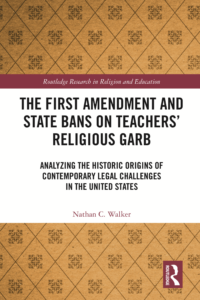 “Walker offers a masterfully meticulous treatment of the relevant law and literature, the factual context, and a concluding legal analysis. Walker’s command of the germane material—legal, historical, and even philosophical—is simply extraordinary. More than a legal argument, the book is a sweeping account of the nature of public education within a liberal democracy—its proper purposes and limitations… Walker’s argument is a complex one, but written in the kind of accessible, jargon-free prose that should be digestible for even the layperson. A thorough, magisterial account of a timely and historically important legal debate.” ~ Kirkus Reviews
“Walker offers a masterfully meticulous treatment of the relevant law and literature, the factual context, and a concluding legal analysis. Walker’s command of the germane material—legal, historical, and even philosophical—is simply extraordinary. More than a legal argument, the book is a sweeping account of the nature of public education within a liberal democracy—its proper purposes and limitations… Walker’s argument is a complex one, but written in the kind of accessible, jargon-free prose that should be digestible for even the layperson. A thorough, magisterial account of a timely and historically important legal debate.” ~ Kirkus Reviews
“Walker’s book is particularly urgent and timely, and is a welcome guide for legal scholars and education policymakers alike. While Walker addresses a specific matter—religious garb in public schools—it raises a more profound, and perennial one: How do we adequately prepare the next generation to navigate pluralism and liberal democracy? Walker’s argument is that laws against religious manifestations in schools diminish rather than enhance this preparation. Far from being indoctrinatory, he suggests, religious attire in the public schools represents an important reference point for students about what it means to live in a demographically and ideologically diverse community. His argument thus points beyond the narrow scope of the book’s inquiry and toward the central dilemma of how democratic life ought to be organized and nurtured… Would a clear Supreme Court ruling supporting teachers’ religious garb in schools make a difference? It might. At the very least, it would offer an opportunity for legal scholars, education policymakers, parents, and activists, to engage in democratic deliberation about the relationship between exposure and indoctrination. Walker’s book can prepare us for that conversation because, to my knowledge, his is the most extensive treatment of the subject to date.” ~ Journal of Law & Religion
14. Nathan C. Walker, Cultivating Empathy: The Worth and Dignity of Every Person—Without Exception. Boston, MA: Skinner House Press, 2016.
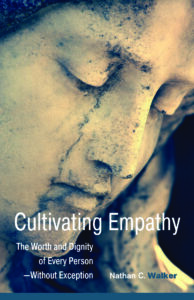 In November 2016, Publishers Weekly listed Cultivating Empathy as one of “six books for a post-election spiritual detox.”
In November 2016, Publishers Weekly listed Cultivating Empathy as one of “six books for a post-election spiritual detox.”
“The 2016 U.S. presidential election cycle represented a stark reminder of how the failure to engage our moral imagination can limit our ability to have meaningful dialogue and discourse with a respected other. Walker does not address the election per se, but his ideas on empathy and the moral imagination provide an interesting and useful framework to consider various aspects of social behavior surrounding the election. Walker draws on various personal experiences and historical events to illustrate the importance of empathy in our daily human interactions and the often painful internal struggle required to achieve a fundamental understanding—or at least appreciation—of others. Walker’s willingness to lay bare his own shortcomings contributes to a fast and rather enjoyable read that is generally accessible to the lay reader. He argues that when we fail to engage our moral imagination—or, more specifically, when we engage a shadow side of our moral imagination—we tend to distinguish the other (or “otherize”) in a negative manner that inherently reduces his or her position as a co-equal. Walker’s anecdotes and experiences he describes can help us illuminate our own (in)ability to experiment with the moral imagination.” ~ Derek C. Oliver, Journal of Constructivist Psychology, Vol. 31, Issue 4, 2018
15. Nathan C. Walker, Exorcising Preaching: Crafting Intellectually Honest Worship. St. Louis, MO: Chalice Press, 2014.
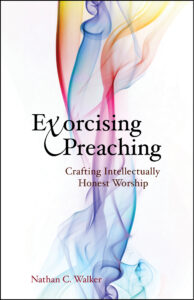 “These poignant and transparent wrestlings of a young preacher in the early 21st century suggest that preaching is not a dying privilege, but a powerful and democratic engagement with truthfulness, an art form still emerging in our days.” ~ Rev. Dr. Mark Belletini, Senior Minister, First Unitarian Universalist Church of Columbus, Ohio
“These poignant and transparent wrestlings of a young preacher in the early 21st century suggest that preaching is not a dying privilege, but a powerful and democratic engagement with truthfulness, an art form still emerging in our days.” ~ Rev. Dr. Mark Belletini, Senior Minister, First Unitarian Universalist Church of Columbus, Ohio
“In the tradition of Emerson’s Divinity School Address, Nate Walker’s Exorcising Preaching is not so much a how-to manual as it is an urgent manifesto, a passionate call for preachers to rid themselves of cant, cliché, complacency, and all that separates them from their audience (the congregation) and their subject (the Sacred).” ~ Rev. Dr. Robert Hardies, Senior Minister, All Souls Church, Unitarian, Washington, DC
“Nate Walker is boldly creative—a visionary, on-the-edge kind of thinker. This book made me rethink preaching’s role today for contemporary worshipers.” ~ Rev. Meg Riley, Senior Minister, Church of the Larger Fellowship
“Nate Walker pokes and prods all of us to whom a pulpit has been entrusted, exhorting us to embrace our special responsibility vigorously. Like his ministry and his activism, his suggestions are bold, creative and provocative, focused powerfully on a witness of liberation.” ~ Reverend Burns Stanfield, Pastor, Fourth Presbyterian Church, South Boston, Instructor, Harvard Divinity School.
Edited Volumes
16. Michael D. Waggoner and Nathan C. Walker, eds., The Oxford Handbook of Religion and American Education. New York: Oxford University Press, 2018. [Peer reviewed] Contributed to the chapters “Religiously Affiliated Charter Schools” and “Religious Expression in Public Schools.” Foreword by Martin E. Marty.
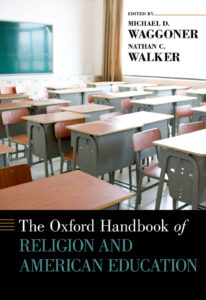
“A comprehensive and probing guide to the meeting of schools and faith in the American experience.” ~ Kirkus Reviews
“An impressive feat bringing order to this topic without sacrificing scope. The handbook can be thought of as a map or guidebook to the places where religion and American education intersect. This book is useful to almost all scholars of the humanities, social sciences, or legal studies—regardless of their specific areas of interest. These fields concern themselves with the articulation and transmission of norms for personal and social conduct, and would find that this study of the role of religion in both formal and informal education clarifies our understanding of how this transmission occurs in American life… I recommend it highly.” ~ Andrea L. Turpin for Reading Religion, American Academy of Religion
The Oxford Handbook of Religion and American Education “thoroughly covers American faith-based K-12 education, religion and public schools, and religion and higher education … impressive and informative” ~ Neil Dhingra, Ecclesiology
17. Nathan C. Walker & Edwin J. Greenlee, eds., Whose God Rules? Is the United States a Secular Nation or a Theolegal Democracy? New York: Palgrave Macmillan, 2011. [Peer reviewed]. Foreword by Former British Prime Minister Tony Blair. Contributors included Martha Nussbaum, Kent Greenawalt, Robert George, and Mark Rozell.
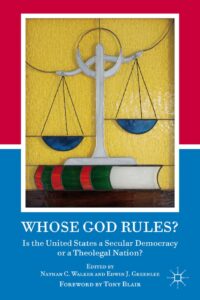 The book débuted Dr. Walker’s theory “theolegal democracy”—an analysis of a political system that permits, rewards, and encourages officials to use theology to make law without formally establishing a state religion.
The book débuted Dr. Walker’s theory “theolegal democracy”—an analysis of a political system that permits, rewards, and encourages officials to use theology to make law without formally establishing a state religion.
“Whose God Rules? offers an illuminating new frame to revitalize the stale debate over church-state separation. Bringing a thoughtful and diverse group of experts to the table, Walker and Greenlee present a feast for the intellect that challenges us all to become better citizens.” ~ Forrest Church, author of So Help Me God: the Founding Fathers and The First Great Battle over Church and State
“This erudite book offers a rare and unusual combination; it includes a broad range of topics treated in depth by a diverse group of contributors who write about a distinctive and controversial concept, namely theolegal democracy. It is sure to provoke an interesting and renewed debate about the relationship of religion and politics.” ~ Leslie Griffin, University of Houston Law Center and author of Law and Religion: Cases and Materials
Select Articles
Law, Religion, & Politics
18. Elisabeth Krimbill, Maureen Fox, Nathan C. Walker, and George Morris, Legal and Medical Principles for Leading Public Schools Throughout the COVID-19 Pandemic, 404 Educ. L. Rep. 415 (2022). [Peer reviewed.]
19. Nathan C. Walker, “Political Contempt and Religion” in Paul Djupe, ed., The Oxford Encyclopedia of Politics and Religion. New York: Oxford University Press, 2019. [Peer reviewed].
Dr. Walker introduces the Religious Contempt Scale, a legal measurement to gauge a democracy’s willingness to either rule from a place of contempt for the religious other, from a state of passive political tolerance, or from a constitutional commitment to actively protect the rights of those with whom we disagree. When special attention is given to the frequency and degrees of severity of expressions of contempt, it becomes clear that contempt has political utility: to motivate the intolerant to gain access to power and, in turn, to motivate those who are intolerant of intolerance to remove them.
Religious Literacy
20. Nathan C. Walker and W. Y. Alice Chan, eds., special edition, “Religious Literacy Across the Professions,” Religion & Education 48, no. 1 (March 2021). [Peer reviewed]
21. Nathan C. Walker, W. Y. Alice Chan, and H. Bruce McEver, “Religious Literacy Civic Education for a Common Good,” Religion & Education 48, no. 1 (March 2021). [ Peer reviewed]
22. Amarnath Amarasingam, Hicham Tiflati, and Nathan C. Walker, “Religious Literacy in Law: Anti-Muslim Initiatives in Quebec, the United States, and India,” Religion & Education 48, no. 1 (March 2021). [Peer reviewed]
Religious Pluralism
23. Nathan C. Walker, “Diversity over Uniformity: Teachers, Religious Garb and Public Schools” in ed. Charles C. Haynes, Teaching about Religion in the Social Studies, NCSS Bulletin 117. Silver Spring, MD: National Council of Social Studies, 2019.
24. Nathan C. Walker, “A Scholar’s Lament: Public Acts of Grief in a Nation of Religious Minorities,” in Sabrina D. MisirHiralall, Christopher Fici and Gerald S. Vigna, eds., Religious Studies Scholars as Public Intellectuals. New York: Routledge, 2018. [Peer reviewed]
25. Nathan C. Walker, “A Legal Approach to Questions about Religious Diversity” in Chad Meister, ed. The Oxford Handbook of Religious Diversity, Oxford Handbooks Online. New York: Oxford University Press, 2013. [Peer reviewed]